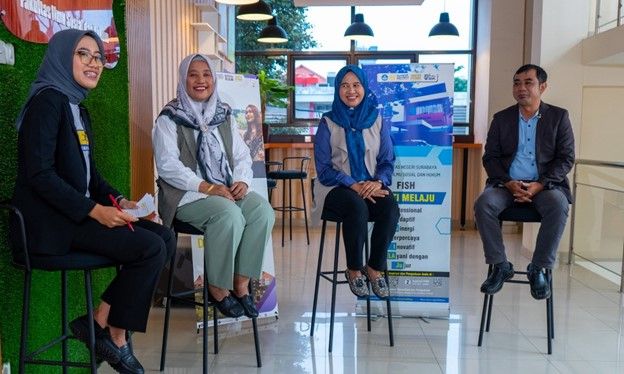
www.unesa.ac.id
Unesa.ac.id., SURABAYA—The Faculty of Social and Legal Sciences (FISH) is being transformed into two different faculties. Study programs that were categorized as legal disciplines became the Faculty of Law (FH), while FISH was transformed into the Faculty of Social and Political Sciences (Fisipol).
"This year FH will be established which houses increasingly high-level Law study programs. "We are interested in it. Meanwhile, FISH is the Faculty of Social and Political Sciences which houses social science and political science study programs," said Dr. Wiwik Sri Utami, M.P., Deputy Dean 1 of FISH at the UNESA Virtual Campus Expo (UVCE) on Wednesday, 28 February 2024.
The lecturer who handles the fields of learning, research and community service, student affairs and FISH alumni He added that the faculty, which will soon officially become Fisipol, has eight undergraduate study programs (S-1), consisting of 4 education study programs and 4 pure study programs.
"One of our advantages is that we have a priority program, namely the internationalization program. "There are 3 of our study programs that are internationally accredited by AQAS from Germany. This year, there will be 5 more study programs that will receive international accreditation," he explained.
Apart from that, almost every study program in the faculty at Campus 1 Ketintang Surabaya it already has international class. Even though it is still bilingual, international classes are a superior program.
Furthermore, internationalization can also be seen from student activities which regularly carry out student exchanges, both academic and non-academic, in various countries. One of these programs is the international PLP which is attended by education study program students, they have already practiced teaching in Malaysia.
Pure study program students also undergo international internships abroad. This program started last year and is running until this year. Long before that, there was also a student exchange program. "All of these programs receive assistance from universities and faculties," he said.
Deputy Dean for Planning, Finance, Resources, General Affairs, Cooperation, Communication and Information Technology, Indah Prabawati, S.Sos., M .Si., continued that from the aspect of services and infrastructure, FISH is equipped with laboratories (labs) in each study program.
For example, in the PPKn study program there is a Democracy Lab, in the Social Sciences study program there is a Podcast Lab, then in The State Administration study program has a Management and Public Policy Lab, an Office Lab, and has three computer labs supported by the latest equipment.
Apart from that, in the Geography Study Program there is a Remote Sensing Laboratory and a Photography and Broadcasting Laboratory in Communication Sciences. Apart from that, the service governance system has been developed like in financial institutions (Banks) and is digitally based through innovation, Sidilan.
Also, FISH has obtained integrity zone status towards an area free from corruption or WBK and bureaucratic areas clean and serving or WBBM.
The study programs under the auspices of FISH UNESA are as follows, Bachelor of Public Administration Science, Bachelor of Communication Science, Bachelor of Political Science, Bachelor of Sociology , S-1 Pancasila and Citizenship Education (PPKn), S-1 Geography Education, S-1 Social Sciences Education, and S-1 History Education.
Communication Science Study Program Coordinator, Dr. Anam Miftahul Huda, S.Kom., M.Ikom., continued that the FISH study program is said to be a favorite every year. One of them is the Communication Science study program which is always included in the list of 10 study programs with the highest interest at UNESA.
The Communication Science Study Program applies a project and practice-based lecture system to ensure that students can implement their knowledge directly in the world of work, business and industry.
"Our students go into the field a lot, for example creating projects for certain companies or creating certain events. By being directly involved in taking responsibility for and handling events, students understand how to plan strategies, coordinate, attract sponsors, event execution and evaluation," said Anam. []
***
Reporter: Sindy Riska (FISH)/Fatima Najmus Shofa (FBS)
Editor: @zam*
< p>Photo: Public Relations Team DocumentationUVCE FISH Streaming: https://www.youtube.com/watch?v= UiaIv5931l4
Share It On:






